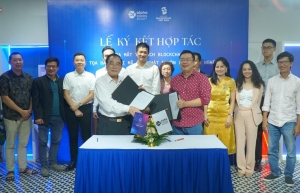Legalities in way of blockchain progress
At the “International experience on blockchain technology development and recommendations for Vietnam” conference held last Friday, Michael R. DiGregorio, the Asia Foundation’s country representative in Vietnam, suggested that the Ministry of Information and Communications (MIC) should allow businesses to experimentally approach areas that are not clearly regulated by laws, such as blockchain.
 |
| Legalities in way of blockchain progress, illustration photo |
The Asian Foundation is collaborating with Vietnam Blockchain Corporation and jupviec.vn to pilot the application of blockchain. After the blockchain platform is successfully integrated into jupviec.vn, the system will connect about 2,000 domestic helpers with potential customers through the website and mobile application.
This creates favourable conditions for workers when looking for a job, helping to increase their ability to negotiate salaries and other benefits related to their work records and professional certifications. Customers can also obtain personal information, experience and work results, and training certificates of workers.
“The legality of this technology has not been guaranteed, so the companies involved in the project are taking risks,” DiGregorio said.
This was also the concern of many business representatives and experts at the conference. The application of blockchain technology is now not only limited to the financial sector as before but also widely spreads to many other fields such as games, electronic contracts, logistics management, traceability of agricultural products, and even a digital government.
In Vietnam, blockchain technology is creeping into the operations of leading enterprises, such as the letter of credit management systems of banks such as MB, Vietcombank, and VPBank.
Techcom Securities also applies blockchain and smart contracts to bond issuance, transaction management, and corporate bond ownership for customers in Vietnam.
Blockchain technology applied in the gaming industry also brings stronger imprints, in which projects like Axie Infinity have become new unicorns with a market capitalisation of up to billions of dollars.
The blockchain platform has brought Vietnamese businesses unprecedented opportunities to develop and challenge themselves in the global playground, but it is also risky when participants are not protected by laws.
Phan Duc Trung, vice chairman of the Vietnam Blockchain Association commented, “Many young Vietnamese people have created GameFi and other products that resonated greatly with the international community. Unfortunately, the legal environment in Vietnam is not enough to really support and promote this activity, and businesses in the blockchain game field are still mainly starting up in foreign countries.”
Therefore, for the first time, a conference was held with the participation of both the legislature, the law enforcement agencies, and technology lovers, which is expected to bring about more positive changes.
“These conferences will be the foundation for Vietnam to soon issue policies to promote the digital economy,” Trung said.
Many countries have realised the potential of blockchain technology and widely applied it to fields such as education, healthcare, and transportation.
In 2016, Japan amended the Payment Services Act and the Act on Prevention of Transfer of Criminal Proceeds, thereby putting crypto assets under the management of legal regulations. In 2019, Japan once again revised related laws.
Switzerland also considers blockchain technology very important in the management of digital assets. The policies of this country are made from a technology-neutral point of view, the decision-making power will not belong to the government, but businesses and people will decide for themselves.
In the United States, a number of central and local governments are applying blockchain in providing public services. The US has also shown caution when it comes to digital asset management, but still strongly supports and participates in the G7 cryptocurrency initiative.
Nguyen Manh Tien, vice chairman of the National Assembly Committee for External Relations said, “This big playground needs timely direction and guidance.” He asserted the need for clearer legal directions so that Vietnam does not lag behind the technological development of many countries in the world.
According to Pham Quoc Hoan, deputy director of the National Electronic Authentication Centre under the MIC, there are eight countries in the world that have a roadmap and strategy for blockchain development.
“India has a strategy to integrate modern technology with blockchain. The European Union also makes blockchain a priority to build legislation and infrastructure. Vietnam has built a blockchain community with excellent individuals, but it is not enough, the state needs to develop a specific roadmap for investors and businesses to see opportunities,” Hoan confirmed.
 | Opening up capital flows for local blockchain startups A more transparent system and speedy investment attraction are making blockchain-related ventures a fertile ground for startups in Vietnam. |
 | Blockchain industry faces talent shortage A lack of human resources in the booming blockchain industry is one of the biggest problems in developing blockchain projects in the country. |
 | Passion is available to turn Vietnam into blockchain hub Even if traditional entrepreneurs have a fantastic business idea, typical fundraising processes require significantly more effort, time, and money. William Do, CEO of HOBBIT Investment, explained to VIR’s Hoang Dan why fundraising in crypto may offer an alternative that is best suited for blockchain-related projects. |
 | The Blockchain Bookshelf: A future technological foundation The Vietnam Blockchain Association (VBA) and Alpha Books JSC revealed the Blockchain Bookshelf on August 5 in Hanoi following the execution of a strategic partnership agreement. |
What the stars mean:
★ Poor ★ ★ Promising ★★★ Good ★★★★ Very good ★★★★★ Exceptional
Themes: Digital Transformation
- PM sets five key tasks to accelerate sci-tech development
- Ho Chi Minh City launches plan for innovation and digital transformation
- Dassault Systèmes and Nvidia to build platform powering virtual twins
- Sci-tech sector sees January revenue growth of 23 per cent
- Advanced semiconductor testing and packaging plant to become operational in 2027
Related Contents
Latest News
More News
- Ho Chi Minh City launches plan for innovation and digital transformation (February 25, 2026 | 09:00)
- Myriad risks ahead, but ones Vietnam can confront (February 20, 2026 | 15:02)
- Vietnam making the leap into AI and semiconductors (February 20, 2026 | 09:37)
- Funding must be activated for semiconductor success (February 20, 2026 | 09:20)
- Resilience as new benchmark for smarter infrastructure (February 19, 2026 | 20:35)
- A golden time to shine within ASEAN (February 19, 2026 | 20:22)
- Vietnam’s pivotal year for advancing sustainability (February 19, 2026 | 08:44)
- Strengthening the core role of industry and trade (February 19, 2026 | 08:35)
- Future orientations for healthcare improvements (February 19, 2026 | 08:29)
- Infrastructure orientations suitable for a new chapter (February 19, 2026 | 08:15)

 Tag:
Tag:



















 Mobile Version
Mobile Version